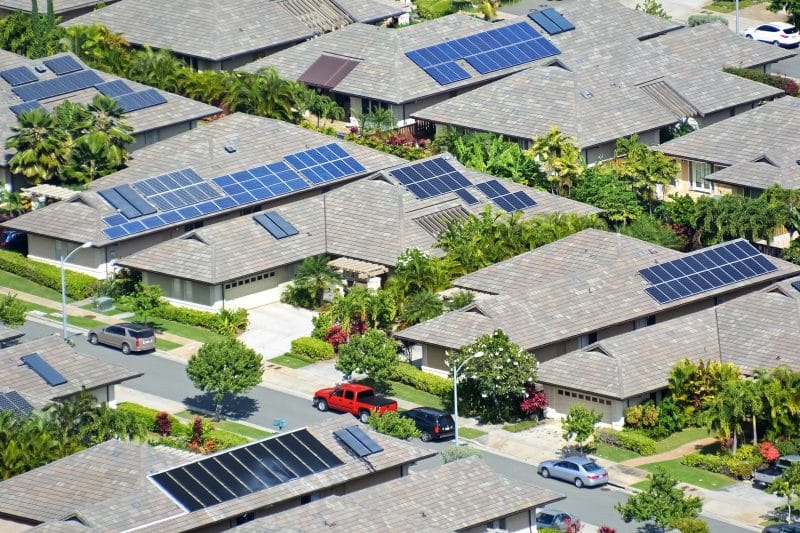Hybrid inverters may have cropped up in your research when you’ve been looking into solar panel options. If you’re asking ‘ what is a hybrid inverter?’ then let us take you through a few of the basics…
What is a solar inverter?
An inverter forms part of a solar power system. Inverters work to convert direct current (DC) power from solar panels into alternating current (AC) power, making the energy useful for powering home appliances.Without a solar inverter in your solar panel system, it would be impossible to power your home using solar energy.They also communicate with the National Grid, giving information about your solar power system’s power production.But what is a hybrid inverter? Is there a difference between hybrid and other existing solar inverters? Here is a quick rundown of all you need to know…
The different types of solar inverter
There are four main types of solar inverters: string inverters, micro inverters, hybrid inverters and power optimisers.They each have slightly different characteristics.A solar panel setup with a conventional inverter requires a separate inverter to transform AC electricity to DC electricity, back and forth. If you’re using a hybrid inverter, however, a separate battery inverter is not required. A hybrid inverter can function as both an inverter for electricity from your solar panels and a solar battery.But what is a hybrid inverter and how does it work?Let’s take a closer look…
What is a hybrid inverter?
Hybrid inverters, also referred to as hybrid grid-tied inverters or battery-based inverters, combine solar inverters and battery inverters into a single piece of equipment.We already know that solar inverters convert DC energy into AC electricity in order to power your home’s appliances. However, traditional solar inverters need solar batteries to store electricity in DC form. A hybrid solar inverter can not only convert the power into AC electricity, but in itself is also capable of storing energy. Any surplus DC power is reserved in a solar battery, or is sold off to the grid. The stored electricity can then be inverted to AC to be used in your household whenever necessary.
Benefits of hybrid inverters
If you have been asking the question ‘what is a hybrid inverter’ then chances are you’re keen to know if they could be of any benefit to you and your home.There are many fantastic advantages to investing in hybrid inverters. Here are a few:
- Resiliency
Hybrid inverters keep your property running on backup solar power during a grid outage.
- Monitoring of energy
With a hybrid inverter, all of your solar electricity is converted through one component. That makes ‘centralised monitoring’ possible. In this process, you can monitor your solar panel system and battery performance through one platform, rather than through multiple inverters and component manufacturers. These systems are known as a Battery Energy Storage System (BESS). These systems usually have a standard solar inverter along with an interactive or multi-mode battery inverter, which optimises energy usage using software.
- Optimisation of solar power as a renewable resource
As most people work outside of the home during the daytime, we are not around when our solar panels are producing the majority of their power. Most of the power generated is used to power home appliances that keep ticking over in the background, like fridges.Most of the excess energy, however, is sent to the grid if it isn’t stored away.That’s where batteries come in. Batteries exist to save the energy generated during the day, so that it can be used in the evenings or on days with bad weather.
- Retrofit battery storage installations
One of the biggest benefits of a hybrid inverter is that it combines the functionality of two separate pieces of equipment into one. You may save money by installing a hybrid inverter from the outset, rather than retrofitting an AC coupled battery to an existing system, as only one inverter and install will be needed.
- Low maintenance
There is no fuel involved, so hybrid inverters do not require frequent servicing.
Downsides of hybrid inverters
The same question of ‘what is a hybrid inverter?’ usually also comes with a degree of doubt about their usefulness for you.It’s true that hybrid inverters are not the right solution for every solar panel system. Keep these slightly more complicated points in mind:
- Equipment and installation costs
Your solar panel system already has its own grid-tied inverter, so choosing to switch to a hybrid inverter can require additional re-wiring and labour, which of course means extra costs.Hybrid inverters can also cost more upfront than installing a traditional grid-tied solution. However, they can be a worthwhile investment , especially if you experience frequent power outages or want to use a battery for electricity rate arbitrage.
- Future design flexibility
Some energy storage systems, like the sonnen eco, come with a built-in inverter, which makes the need for a hybrid inverter null and void.Installing a hybrid inverter could potentially limit your options when it comes to future storage technologies.
So now you know a little more about hybrid inverters. If you would like to know more about them, or have any other questions, get in touch with us today.

